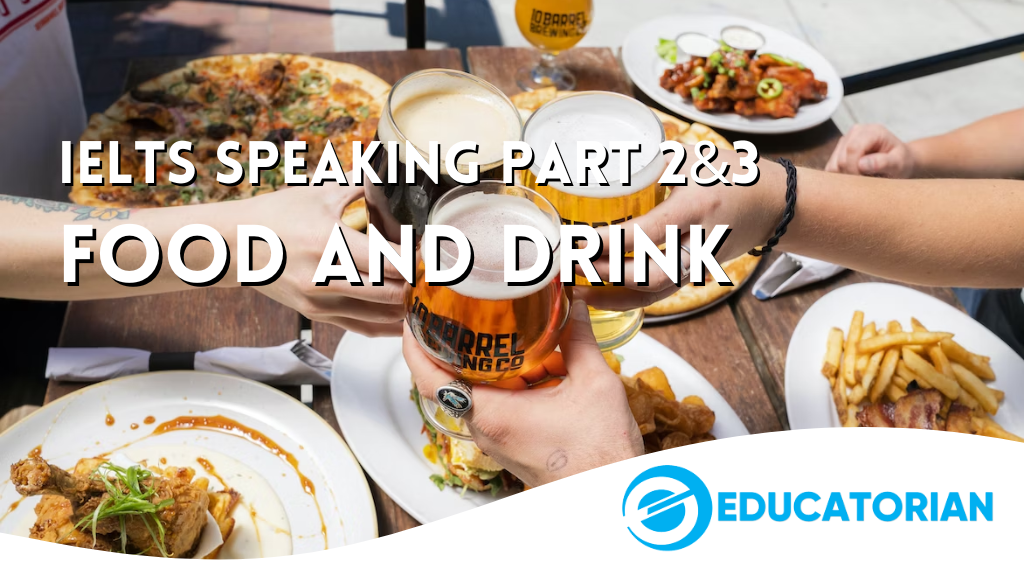
IELTS Speaking Part 2 and 3 – Food and Drink
IELTS Speaking Part 2 and 3: Food and Drink
Describe some food or drink that you learned to prepare.
You should say:
- what food or drink you learned to prepare
- when and where you learned to prepare this
- how you learned to prepare this
- and explain how you felt about learning to prepare this food or drink.
IELTS Speaking Part 2 and 3: Food and Drink
I developed a strong liking for pasta, but most of the pasta dishes in my country tend to be on the sweeter side. When I tried authentic Italian spaghetti Bolognese, I was fascinated by how different it tasted. This inspired me to learn how to make it myself.
To begin, I turned to online resources and watched Gordon Ramsay’s tutorials on pasta-making and proper cooking techniques. I made sure to prepare my kitchen, ensuring that I had all the necessary ingredients. I had my new pot and made sure I had tomato sauce, wine, and meatballs.
Initially, the taste didn’t quite hit the mark because I struggled with seasoning. I had to double-check and find the right ingredients and spices to achieve that creamy, spicy, and slightly salty-sour taste. In the early stages, the flavor was either too sour or too spicy, so I had to find the right balance. I searched for other resources and YouTube chefs, which provided clearer instructions. I also experimented with different types of wine to enhance the flavor.
Continuation
As time went on, I gradually improved. After a couple of months, I was able to make a decent dish. Through practice, I became more efficient. I used to spend an hour preparing noodles or the sauce, but as I became more familiar with the process, I could finish it within 30 minutes. My kitchen used to be a mess, but now it’s much more organized.
After mastering spaghetti Bolognese, I challenged myself to make ravioli and explore different types of pesto. I learned that pesto is not just cream-based but can also be made with eggs, requiring a careful balance. These are some of the things I learned through the step-by-step process. I started with pasta and gradually expanded my repertoire to include various pasta dishes.
IELTS Speaking Part 2 and 3: Food and Drink Continuation
What kinds of things can children learn to cook?
I think one of the most important things that children can learn to prepare is desserts. For example, soft serves and pies These are the things that don’t require sharp objects or heat, so it’s a safe starting point for kids. They are less likely to have accidents. Once they learn how to use proper utensils, they can move on to baking. At that stage, they can ask their parents to put it in the oven, which is less dangerous. As they become better, they can start cooking things that require a little bit of heat, like omelets or pancakes. These are easy and less dangerous. Gradually, they can progress from non-baking to baking to cooking.
Do you think it is important for children to learn to cook?
Yes, I believe it’s very important for children to learn how to cook at a young age. As you grow older, you need to learn how to be independent. From my own experience, I didn’t know how to cook until I was in my 20s, which was terrifying. I couldn’t even cook simple meals. Even now, at my age, I still struggle to use a knife. So, as a child, it’s important to start learning how to use different utensils. This is a vital survival skill.
Do you think young people should learn to cook at home or at school?
I believe both options are beneficial. Learning to cook at home allows you to learn in a relaxed environment and at your own pace. Your parents can be understanding of your mistakes, and even if you mess up the kitchen, a few simple tips from your parents would suffice. On the other hand, learning to cook at school teaches discipline and cleanliness. You learn to clean as you go and take care of the kitchen for others to use. It also helps you become more connected with people, whether they are your friends or family members. Moreover, food safety is emphasized more in a school setting due to the larger number of students. So, a combination of both home and school learning is ideal.
How enjoyable do you think it would be to work as a professional chef?
I believe that if you truly enjoy what you do, regardless of the difficulties, you can still find enjoyment in being a chef. Take Marco Pierre White, for example. He was considered one of the youngest celebrity chefs in the UK. He stated that he loves what he does, even though it involves insufficient sleep and stress. Cooking is like an art to him. He enjoys it, and achieving Michelin recognition and popularity makes it worthwhile. He is now 61 but still cooks. So, if you have a genuine passion for cooking, you can find enjoyment in it.
What skills does a person need to be a great chef?
Apart from culinary skills such as plating and cooking techniques, effective communication is essential to being a great chef. It’s not just about shouting at people; it’s about conveying the right words and instructions accurately to ensure an effective team. This has been evident in shows like Hell’s Kitchen with Gordon Ramsay. To be successful in the kitchen, you need to communicate properly and precisely so that your targets and instructions are not missed. Effective communication is crucial, regardless of how skilled you are in cooking. Without the ability to convey your ideas to others, you cannot be a good chef.
How much influence do celebrity/TV chefs have on what ordinary people cook?
I would say that celebrity chefs, especially those on YouTube, have a significant influence on what ordinary people cook, especially after the COVID-19 pandemic. They focus more on cooking with typical ingredients that can be found at home or in the market. Previously, ingredients used by chefs were often expensive and hard to find. However, now the emphasis is on simple ingredients and making them taste good. People are influenced by the cooking demonstrations they watch, and many can now cook dishes based on their favorite subscribed YouTube chefs. For example, I enjoy Gordon Ramsay, so I often cook his past dishes, although not necessarily the French ones.
Check IELTS Rizz and my personal site:
Check other IELTS Speaking here.

Ian Tanpiuco is an ESL and virtual assistant. With a decade of experience, he has become an expert in his field. Dedicated to helping others achieve their goals, Ian works tirelessly in the classroom or as a virtual assistant.

